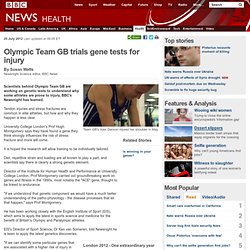

Genetics and sports. Olympic Team GB trials gene tests for injury. 25 July 2012Last updated at 00:05 ET By Susan Watts Newsnight Science editor, BBC News Team GB's Alex Danson injured her shoulder in May Scientists behind Olympic Team GB are working on genetic tests to understand why some athletes are prone to injury, BBC's Newsnight has learned.

Tendon injuries and stress fractures are common in elite athletes, but how and why they happen is less clear. University College London's Prof Hugh Montgomery says they have found a gene they think strongly influences the risk of stress fracture and more will come. Gender testing in sport: A case for treatment? Caster Semenya wins the 800m final at the 2009 World Championships With the Vancouver Winter Olympic Games under way, leading sporting bodies continue to be embroiled in one of sport's biggest controversies - the gender verification testing of female athletes.
In January a symposium of experts in Miami concluded that some athletes discovered to have gender ambiguities be advised to have treatment, possibly even surgery, to continue competing at international level. Last week the International Olympic Committee's General Assembly was briefed by the head of its Medical Commission Professor Arne Ljungqvist who recommended that "strategically located centres of excellence should be established to which athletes with a DSD (disorder of sex development) could be referred and, if necessary, further investigated and treated.
" "To be clear women are the target here. This issue is about the classification of female athletes not male athletes. Carl Valle on Genetic Testing. The COL5A1 gene and Achilles tendon pathology - Mokone - 2005 - Scandinavian Journal of Medicine & Science in Sports. Abstract Purpose: There is an increase in the incidence of Achilles tendon injuries as a result of the participation in physical activity.

It has been suggested that some individuals have a genetic predisposition to Achilles tendon pathology (ATP).